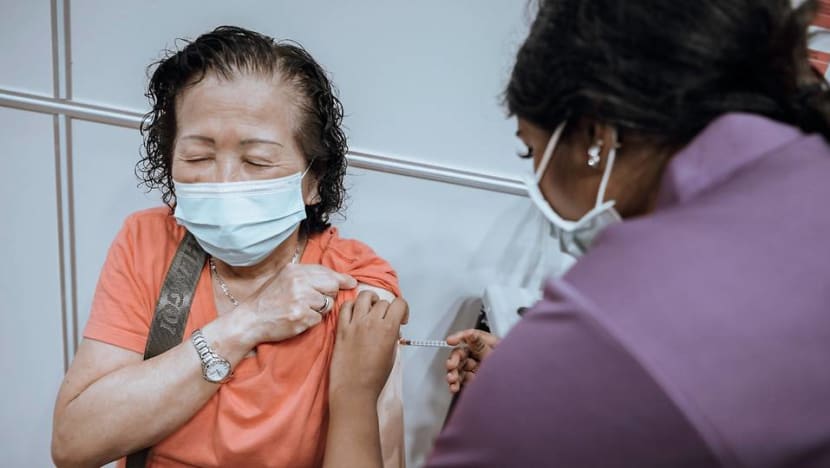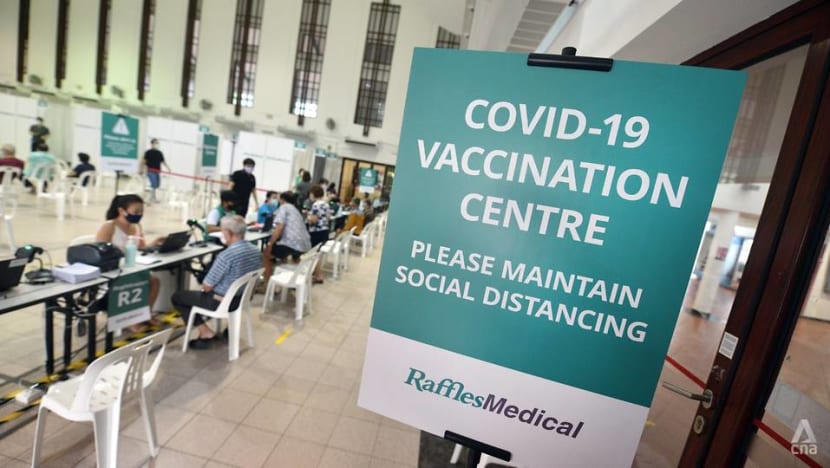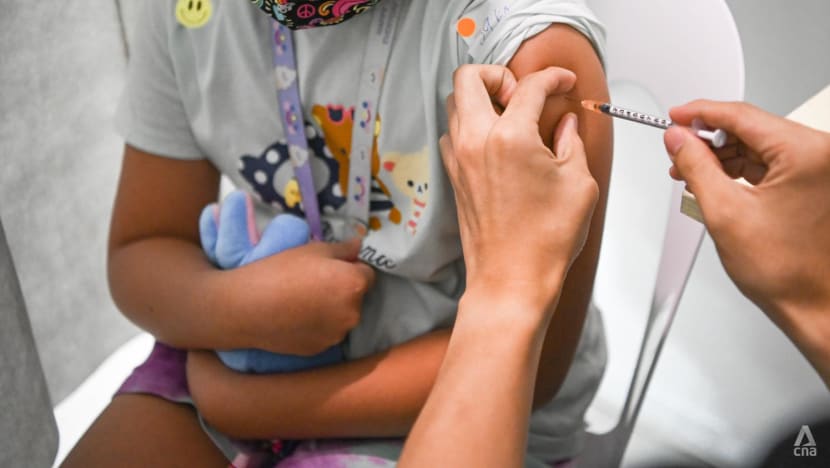Commentary: We may not need that Omicron-specific COVID-19 vaccine after all
As Singapore lifts more COVID-19 restrictions, there are questions about whether current vaccines will protect us against new viral variants. But the risks of repeated boosters for all might outweigh the benefits now, says Duke-NUS Medical School’s Ooi Eng Eong.

SINGAPORE: By now, many of us would have received three shots of a COVID-19 vaccine. Some may even have taken a fourth shot.
With the latest easing of COVID-19 measures from Tuesday (Apr 26), Singapore will be back “almost all the way to how things were” before the pandemic. But COVID-19 is here to stay and we can expect new variants of concern (VOCs) to emerge periodically.
What happens if a future variant appears, with the potential to disrupt our lives again? After all, Singapore had achieved high vaccination coverage when Omicron hit in November 2021, but the relaxation of measures was put on hold to buy time to learn about the new variant.
Will all of us need a second booster shot or even annual boosters? Will we need Omicron-specific or other variant-specific vaccines? Will we need new COVID-19 vaccines to deal with future variants?
Answers to these questions very much depend on what we are willing to live with.
For the virus, this is a matter of survival. It must stay ahead of the immune response or it will die out. Now that the majority of the world’s population has immunity, either through vaccination or infection, this virus will likely acquire mutations that would enable it to evade some (but not all) of our antibody responses.
DO WE NEED UPDATED VACCINES EVERY TIME A NEW VARIANT APPEARS?
However, this does not mean that the current vaccines cannot protect us. Our immune system is a lot more sophisticated than we imagine.

By now, many are likely aware that vaccination produces neutralising antibodies that prevent infection by blocking SARS-CoV-2 virus from entering our cells. However, if antibody levels are too low or if the virus has acquired sufficient mutations to evade them, breakthrough infections can occur.
When there is an infection, the job of limiting viral spread in the body and preventing severe disease falls on killer T cells – so called because they detect and kill infected cells along with the viruses within.
Killer T cells and antibodies “see” a virus differently. If we think of the virus as having a key to unlock the door to our cells, neutralising antibodies bind to the key’s teeth and block it from unlocking and entering, while killer T cells can sense any part of the key after the virus is in our cells.
Omicron is better at evading our antibodies due to mutations in the key’s teeth, but most of us can fight it off as our T cells still recognise the rest of the key. To fully escape T cells, a virus would have to undergo a massively improbable number of mutations.
So the good news is that we, therefore, do not need vaccines for every VOC.
Not all vaccines, however, produce virus-specific killer T cells effectively. For example, the seasonal influenza vaccine does not do so effectively and reliance on antibodies alone for protection is partly why we need annual influenza vaccination. Fortunately, mRNA vaccines have been able to elicit killer T cell responses well.
DO WE NEED REPEATED BOOSTER SHOTS?
But will we need to get repeatedly jabbed to keep up antibody levels for protection?
Antibody levels against all viruses, whether from vaccination or infection, decline with time. Regardless, both B cells (antibody-producing cells) and T cells have memory. These memory cells can be rapidly activated and expanded to swiftly deal with infection – even after antibodies wane.
Whether we need repeated booster vaccinations depends on whether we need to prevent all symptomatic infections or just severe COVID-19.
If we aim to stop all cases from happening, then we need baseline levels of antibodies to be sustained over long periods. That can only be done through repeated booster vaccinations.
But if most of us can tolerate flu-like symptoms, such as fever, cough and body ache, and live with them for a few days without hospital care, repeated boosters won’t be needed.
Scientists have repeatedly demonstrated that vaccination will prevent severe COVID-19 in immunocompetent individuals. Booster shots can then be reserved for those whose immune functions are less robust or compromised by chronic illnesses.
I think the choice has been made for us by the virus. Variants will continue to emerge as that is a matter of survival for the virus. We will not be able to block SARS-CoV-2 out from the human population entirely.

ALWAYS A QUESTION OF RISKS VERSUS BENEFITS
The reality of emerging variants is, however, not bleak. Our present situation is very different from that in 2020 and early 2021 when we could not prevent severe COVID-19. We can now.
I would go a step further and argue that the risks of adverse events from universal repeated boosting would outweigh the benefits.
Like all medicines, vaccines have side effects. These risks have to be counterbalanced by the benefits of preventing what happens if we are unvaccinated.
If the number of COVID-19 cases - that overwhelm our healthcare resources and cause preventable deaths - is large, then the risk of boosters is low compared to the benefit of safeguarding our healthcare system. This was indeed the case in 2021 when we received the first two shots.
If we are now mostly protected, the risk of severe adverse events from boosting everyone repeatedly will be amplified exponentially – even if they remain extremely uncommon, at about 0.007 per cent of all administered doses in Singapore, according to the Health Sciences Authority in March.
As we learn to “live with COVID-19”, regular booster shots will likely be useful for a subset of our population, such as the elderly and those who are immunocompromised.
This looks like the approach that Singapore is taking – a second booster shot is recommended for those aged 80 and above, residents of aged care facilities and the medically vulnerable. It is not recommended for any other groups, though those aged 60 to 79 can request to take it.
WE SHOULDN’T STOP INVESTING IN BETTER VACCINES
What becomes more important then is to keep up active surveillance for severe COVID-19 cases.
Although annual boosters are unnecessary for now, the risk-benefit analysis may change. We still do not know how many years immune memory from mRNA vaccination in the immunocompetent will last, nor if future variants could cause more severe disease.
We should continue investing in the next generation of COVID-19 vaccines, that could produce more robust immunity or provide broader protection against all possible variants, so that when we all do eventually need a booster shot, it can last us a lifetime.
Ooi Eng Eong is a Professor with the Programme in Emerging Infectious Diseases at Duke-NUS Medical School and Saw Swee Hock School of Public Health, National University of Singapore. He is also Co-Director of the Viral Research and Experimental Medicine Centre @SingHealth Duke-NUS (ViREMiCS).





















